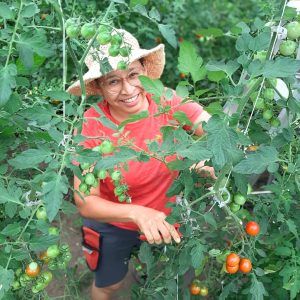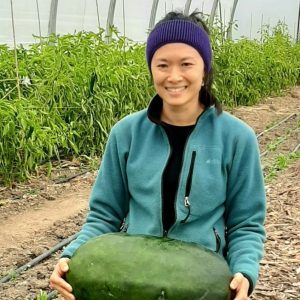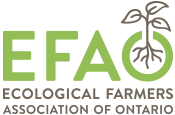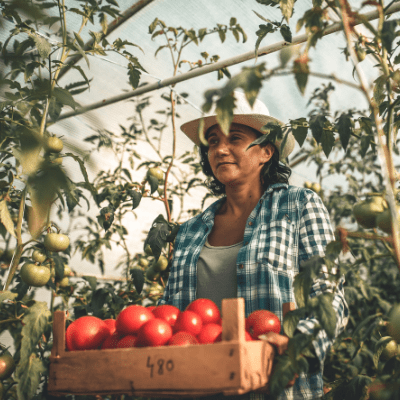This Q&A is part of a two-part series about EFAO’s beginning steps in addressing anti-racism and equity within agriculture. Part One, published in Ecological Farming in Ontario, shares insights and thoughts from Angel, Amy, and Ali, while Part Two shares a brief summary of the feedback that we have received so far from EFAO’s BIPOC members survey.

Angel Beyde supports the EFAO as Anti-Racism and Equity Consultant, informed by over a decade of experience in social justice non-profit work, as well as urban agriculture and ecological landscaping.

Amy Cheng has been urban market gardening and working in community food programming since 2012, and has been supporting EFAO’s equity work since December 2020.

Ali English is a settler whose ancestors came to Turtle Island from Ireland, Italy and England. She has had the great honour of being EFAO’s Executive Director since 2015.
Please describe your involvement in EFAO’s anti-racism and equity work and what motivated you to do this work.
Ali: For EFAO staff and board, like for so many of us, 2020 and now 2021 have been years of reckoning. None of it is new – the violence perpetrated against Black, Indigenous and People of Colour (BIPOC), the ongoing inequities faced by racialized communities that have only been amplified by COVID – but for some reason, a lot of folks like myself, finally paid attention. I am sad to say that previously, I think I believed that the work of “social justice” was for specific groups dedicated to that work. But now it is clear to me that this is work that all organizations must do. Otherwise we are simply perpetuating the status quo, and all the inequities that exist, and we are only building a better world for some of us.
Angel: My role on the team as Anti-Racism and Equity Consultant germinated during an EFAO webinar in September 2020 when I asked a question about EFAO’s plans for equity, diversity and inclusion, which had been mentioned in passing. A long-time fan of EFAO’s work (as an urban grower / aspiring rural farmer), I was inspired that an ag organization understood anti-racism as relevant to their work in supporting farmers. EFAO reached out post-webinar, which led to a series of in-depth conversations and strategizing with staff, exploring how my expertise in anti-oppression, community building and mental health could clarify and strengthen the EFAO’s approach.
The process has been joyful and energizing as EFAO culture is so hands-on and community-oriented, with the grassroots balanced by policy level thinking. Systemic racism is so deeply rooted in our food system, I am motivated professionally and personally as a Black/ mixed race person to do my part to cultivate equity for all who labour to provide us with food.
Amy: I started supporting this work in December 2020 by helping Angel and Ali with the first BIPOC farmers’ meet-up. Since then, I have been supporting the development, coordination, and implementation of a range of various equity initiatives. I am motivated for this work because of my identity and experiences as a person and farmer of colour, and because of my work in the last 10 years doing market gardening and community food programming with racialized communities in Toronto. My own farming journey was sparked by my passion for growing culturally significant Chinese vegetables (as an incubator farmer operating Red Pocket Farm) and a desire to feed communities underrepresented in the local food scene. From witnessing the social injustices experienced by my immediate BIPOC community (family, friends, colleagues, program participants, etc), and from continuous learning about historical and current events…I want to do my part supporting more equity, ease, peace, and prosperity for BIPOC communities. Despite systemic challenges, I already see amazing community-caring and innovation within BIPOC communities that I am a part of, but I imagine how much more thriving could happen if there were less barriers and more resources.
What do you feel like you have accomplished so far? What has been most rewarding in this work?
Angel: It’s been super inspiring to do outreach, nurturing dozens of new connections within the BIPOC growers community and to introduce new EFAO members to the organization and other helpful resources. I love that kind of match-making and pollinating! My vision of Anti-Racism and Equity work inoculating every aspect of EFAO’s offerings and systems, has been received with enormous enthusiasm and roll-up-our-sleeves energy. We’ve planned, seeded and are nurturing a wide range of initiatives, with more to come: the new BIPOC Farmers Network (nearly 70 members and growing); BIPOC contributors to every issue of the print publication, hosting webinars, speaking at the 2021 conference and other events; a fall Farming For Justice webinar series for white settler farmers; developing a broad scale Land Access Coalition, and more. It’s been rewarding to be of service in a tangible way to increasing equity and opportunities for the BIPOC growers community.
Amy: It has been meaningful to support EFAO’s current equity efforts and contribute ideas for upcoming events like BIPOC board recruitment processes and 2021’s conference planning. A few highlights to-date include:
- Synthesizing and presenting the BIPOC Farmers’ Survey responses to EFAO staff and board. Results will be shared publicly soon;
- Helping to draft the Terms of Reference for the BIPOC Equity and Accountability Committee;
- Providing prototype feedback for a BIPOC map and directory;
- Collaborating with Angel to connect the BIPOC growers community and engage them in EFAO’s work.
I am always excited to connect with any farmer(s) over common interests and a passion for growing, but it’s been especially meaningful to connect with growers who can relate to specific cultural interests or my POC experiences. At recent BIPOC meet-ups, others have also expressed the soothing effect of being culturally seen and heard. It’s fun seeing nods or smiles across my zoom screen when people are sharing culturally-specific anecdotes about food, family, production interests, etc. I am grateful to support these meet-ups since relationship building is foundational for collaboration and achieving collective impact.
Ali: One of the most rewarding parts of this work for me has been working with Angel and Amy and learning from them how they think EFAO could be approaching anti-racism and equity work, and better supporting members who have been underrepresented in the organization. It has also been really meaningful to work with the rest of the staff team, who are very committed to this work, and including a greater diversity of voices in our educational events and publication. Building new relationships with Indigenous and racialized members and partners feels like very meaningful and essential first steps. The staff team has also been reading the incredibly inspiring and insightful book Farming While Black by Leah Penniman, and having honest and difficult conversations about our histories, unconscious behaviours, and what reparations and reconciliation means to us; and these feel like really important conversations.
What challenges are you facing in moving this work forward?
Amy: The things that I find challenging are common to anyone wishing to impact systemic change. It can be hard to focus and prioritize when the causes and solutions to inequity involve many important intersectional issues. Progress can feel slow and small, relative to the enormous systems of disproportionate power and wealth being confronted — so staying optimistic can be hard. But this speaks to the need for collaboration in solution building, the need to support one another for the long haul. On this note, collaboration presents a good kind of challenge for both individuals and organizations, since it requires a ton of empathy, listening, patience, courage, humility, grit, honesty, checking of one’s privileges, sharing. This work challenges us to show up as our best selves as much as possible.
Less philosophically speaking, land access and capital continue to be age-old and ongoing related barriers for farmers, and I look forward to working with others on these issues.
Ali: From where I sit in my role as Executive Director of EFAO, I see the major challenge being the fact that EFAO has historically had a membership and leadership that has been predominantly non-racialized. Mostly white settler farmers and individuals. Becoming a more diverse and inclusive organization takes time — we need to first build relationships and trust. Including a greater diversity of voices and perspectives in our educational events is an important first step, but ultimately we really need to have representation from Black, Indigenous and people of colour on our board and staff, as well as in our membership. These are the folks who will really know what barriers and challenges Indigenous and racialized farmers face in pursuing ecological agriculture and how to best provide support.
Angel: The scale of effort needed to move the needle on the land access and climate crises, which feels central to this Anti-Racism and Equity work, can be overwhelming. Having a personal stake in this (I am looking for land to start a market garden farmstead) is both motivating and at times very tiring. That said, these challenges are also incredible opportunities for restorative connection and collaboration between groups and individuals to overcome barriers related to the commodification of farmland and restoring historically excluded groups (i.e. BIPOC) to an equity position in agriculture. Being part of the Equity team at Farmers For Climate Solutions has been a great experience and a model for what we can accomplish when we pull together. Breaking down silos across sectors is powerful.
What next steps are on the horizon? What feels most urgent or exciting?
Ali: I think the most important next step is continuing to bring a greater diversity of voices to our board and eventually our staff team. The formation of a BIPOC Equity and Accountability Committee is a really exciting next step, as it will help inform and steer this work, and hold us accountable to our goals and progress. And we plan to have a call for new board members this fall, and I can’t wait to see who might be interested in joining, and what skills, perspectives and passions they will bring to the board and the organization as a whole!
Amy: In addition to tackling social justice issues, addressing the climate crisis feels the most urgent.
Angel & Amy: One of the many things we’re excited about is the new BIPOC Equity and Accountability Committee. Having a group of diverse BIPOC voices engaging with EFAO in an advisory capacity is key to advancing equity in the organization and its programming. Adding BIPOC board members feels significant for similar reasons. Lastly, watching the progress-to-date with EFAO’s equity initiatives flourish since December 2020 is amazing; the work has been approached with a lot of thoughtfulness and care from everybody. It’s really nourishing to feel so many connections developing like mycelium through the forest soil. A strong foundation is being established for greater things to come.
Are there any other organizations or initiatives that serve as inspiration for EFAO’s work?
Supporting EFAO’s equity work has inspired us all to expand our horizons a bit and explore the work of other farming & food justice organizations. Among them:
- FoodShare Toronto’s strongly equity-driven organizational structures, policies and practices
- The Groundswell Center for Local Food and Farming’s Equity and Accountability Committee
- Amy attended NOFA-NY’s 2020 conference, and really enjoyed some of their online conference tools and features
- The extensive BIPOC farming advocacy work by Soul Fire Farm and The Northeast Farmers of Colour Land Trust
- The breadth and depth of programming by the Practical Farmers of Iowa in everything from technical skills, to policy, to land conservation and farmland transfer, to farm finances, etc.
Amy: From my time working in urban agriculture in Toronto, I learned so much from a multitude of grassroots organizations and individuals. A critical lesson is the importance of listening to community needs, and allowing communities to shape and lead the work, since they best understand what is needed. This has great relevance to EFAO’s equity work. Given EFAO’s existing “for farmers, by farmers” programming, we already see how community-driven programming can yield effective practical results, so I feel optimistic about the EFAO’s current and future efforts to integrate an equity lens into its work.
—
Since December 2020, much work has been done to “prep the ground” for addressing systemic racism and equity in agriculture. The “mycelium” network of EFAO BIPOC farmers continues to grow, many new ideas and questions have been seeded — some have already germinated and are being nurtured towards fruition. We are very excited and grateful to be working within such an engaged and caring membership.
You can learn more about EFAO’s progress with its anti-racism and equity work on our Anti-Racism in Farming page, and find a summary of the BIPOC Farmer Survey findings in Part 2 of this article. If you have any questions for Angel, Amy or Ali, please don’t hesitate to reach out!

